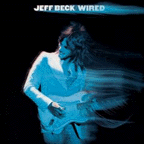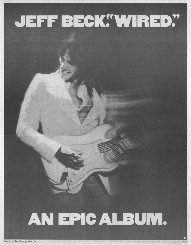![]()
  |

Wired
Jeff Beck
Epic PE 33849
Released: June 1976
Chart Peak: #16
Weeks Charted: 25
Certified Platinum: 11/21/86
 Jazz-rock fusion music has no greater exponent than Jeff Beck, whose latest album, Wired, demonstrates how vital this genre can be. Even more important, Wired presents Beck in a context that finally satisfies both his uncompromising musical standards and commercial necessity.
Jazz-rock fusion music has no greater exponent than Jeff Beck, whose latest album, Wired, demonstrates how vital this genre can be. Even more important, Wired presents Beck in a context that finally satisfies both his uncompromising musical standards and commercial necessity.
Beck's first group, the Yardbirds, was the most inventive of the early Sixties British blues bands and is now credited with producing three of the most important electric guitarists of the past ten years -- Eric Clapton, Beck and Jimmy Page. Both Clapton (with Cream) and Page (with Led Zeppelin) became famous after leaving the Yardbirds.
 Click image for larger view. |
After leaving the Yardbirds, Beck made a classic solo album, Truth, with a band which included Rod Stewart and Ron Wood. Page, meanwhile, formed his own band, Led Zeppelin, whose music was a variation on Beck's concept (compare the versions of "You Shook Me" on Truth and the first Led Zeppelin album). He returned two years later with a jazz-accented R&B outfit based around keyboardist Max Middleton and singer Bob Tench.
Last year, producer George Martin reunited Beck and Middleton for their greatest collaboration, Blow by Blow, which became Beck's best-selling solo album and established him firmly in the jazz-rock hierarchy. But Beck was only developing ideas he'd been playing with for years.
On Wired, Beck invites a direct and favorable comparison with John McLaughlin (with whom he toured last year) by collaborating with ex-Mahavishnu keyboardist Jan Hammer and his band. Martin didn't score any of the horn arrangements because Hammer's synthesizer fills all those spaces, but the album is better recorded and has a much fuller sound than Blow by Blow. Middleton's contribution is still essential -- his one song, "Led Boots," opens the album at its hottest pace and it's definitely enhanced by the interplay with Hammer's keyboards and Beck's guitar. Hammer's synthesizers work from Middleton's clavinette base, and Beck stitches runs in between.
Beck wrote no songs for this record in order to concentrate on his playing, but he dominates the album conceptually. You can tell "Head for Backstage Pass" is bassist Wilbur Bascomb's song from the bass solo that kicks it off, but from there it's all that Beck/Middleton Metal Motown Machine. Drummer Narada Michael Walden contributed four songs, three of which sound like they could have easily come from the Blow by Blow sessions. "Sophie" shows the distance between McLaughlin's cerebral meandering and Beck's incisive, witty compositional ability as the song moves from an introspective theme to an incredibly hard-edged composition. Hammer swings here in a sweating, un-self-conscious ride of pure joy that needs no guru for inspiration. Hammer's "duet" with Beck, "Blue Wind," builds phased rhythm guitars against the tension of those slogging, perfectly imprecise drums into an anthem pitch with furious overhead. Beck's cover of the Charles Mingus ode to Lester Young, "Goodbye Pork Pie Hat," is an unlikely if not unappreciated inclusion that seems to understated to clock in as more than a tentative exploration of an already well-covered tune, but Beck's soloing, as usual, carries it off with some bizarre phrasing and adventurous distortion.
Many of Beck's older fans claim he's toned down to play this music, but listening closely, you can hear all the fire and imagination that has characterized every phase of his career. Wired is the realization of a style Beck has been working toward for years, and should finally attract the recognition he deserves.
- John Swenson, Rolling Stone, 7/29/76.
Bonus Reviews!
Jeff Beck seems to have made his transition from rock to jazz about 90 per cent official. The selections here that can be classified as "jazz/rock" tend to combine the worst excesses of both -- the notion that a riff is a tune, abrupt changes of tempo, obnoxious drumming, and long solos which, since they can't make reference to a nonexistent melody, remain mere pyrotechnics. But those selections that are mostly nearly jazz or all jazz show Beck to be a guitarist of taste, thought, and delicacy. The electric guitar is more a machine than an instrument; Beck is one of the few players able to personalize it without becoming part of the machinery.
Beck's near-complete transition to jazz is understandable; he is simply too good a musicians to remain restricted by rock's leaden simplicities and fuzzy pretensions. If he can avoid the flap-doodle complications of the Mahavishnu school, his complete transition may make him a complete guitarist.
- Joel Vance, Stereo Review, 10/76.
After years of being regarded as one of pop's more innovative and skilled guitarists, Jeff Beck broke through in huge fashion last year with his first all-instrumental LP. Now, working with pianist/clavinette player Max Middleton, synthesist Jan Hammer and several others, Beck pulls together elements of rock, blues, jazz and futuristic European rock, and comes up with another solid instrumental set covering material from Middleton, Hammer, pianist/drummer Narada Michael Walden and Charlie Mingus among others. A number of varied guitar styles included, a number of tempos utilized, with several guitar techniques often used within the same cut. Beck can be effective as a fast, flash guitarist or a slow moody one, as a jazz, rock or blues guitarist or, as heard here several times, as a soulful player. George Martin produced set. Best cuts: "Come Dancing," "Head For Backstage Pass," "Blue Wind," "Play With Me," "Love Is Green."
- Billboard, 1976.
This continuation of Blow by Blow's mindless trickery -- bye-bye George Martin and Stevie Wonder (guess which one is missed), hiya Charles Mingus (an adequate "Pork Pie Hat") -- is supposed to make Jeff a "jazz" musician. In fact, it certifies Jan Hammer and Narada Michael Walden as "rock" musicians (retain quotes please). Best: "Come Dancing," a jumpy little Walden novelty that would make a nice B side for the Meters. B-
- Robert Christgau, Christgau's Record Guide, 1981.
Nearly Blow by Blow's equal, although Beck doesn't venture any further musically. Charles Mingus's "Goodbye Pork Pie Hat" is worth the price alone. * * * *
- Tom Graves, The All-Music Guide to Rock, 1995.
![]() Reader's Comments
Reader's Comments
No comments so far, be the first to comment.